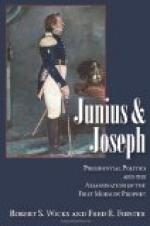The gambling spirit of the young pioneer was aroused.
“What will you lay on it, then?”
“I don’t believe you could row once to the other side.”
He bragged loudly and with much exaggeration of what he had done and what he could do, and began pushing off the boat to show her his speed.
The boat was a rude craft, unpainted, flat-bottomed, but light enough, and not badly formed for speed. Susannah stepped into it without much hope, scarcely caring what she did, but still provoking the young boatman to attempt the crossing.
“I shan’t give you any money,” she said, “but you can row me a bit if you like till I see how fast you can go. You don’t understand the currents, I am sure.”
“Currents!” said the boy, “I guess I understand all there is to know about them.”
Talking thus in light banter, they actually proceeded out onto the bosom of the milky flood without hearing any cry from the shore or seeing any one who took note of their departure. The pellucid and comforting light of the blinded sun grew warmer; the hum of industry in the town behind rose cheerfully upon the quiet air, and as the calling of the April bluebird in the fields grew more faint, the splash of the oars and the whirr of the gray water-fowl began to be accompanied by a low distant sound as of a watermill.
“It’s the excursion steamer,” said the boy. “We’ll get in her waves and you’ll be scared. Ladies is always scared of waves.”
She asked if the steam-boat would stop at the Nauvoo wharf, but he explained, with the knowledge that boys are apt to have of such details, that this steamer was coming from Fort Madison, and would keep to the Missouri side, that he had heard that there were some State officials on board her, escorting the Governor of Kentucky, who was prospecting for a Land Company.
They saw the white hulk of the steam-boat looming upon the water to the north. Her side paddle-wheels churned the flood. A strong purpose took possession of Susannah; she knew what she was going to do.
She said to the boy, “No one could stop a steamer when she once starts until she gets to her next port.”
“I bet the engineman could stop her just as easy as that.” The boy backed water with his oars suddenly.
“But no one on the river could make him stop and get aboard.”
“Yes, they could. My pap stopped one once. We was living down near Cairo, but not near a wharf.”
“How did he do it?” she asked, and her interest was intense.
“Why, you just put up your hands like a trumpet and yell through them as loud as you can, and you go on waving and hollering. My pap said the best plan was to call out ‘Runaway nigger! Large reward!’ They’d be sure to stop then to know all about it, and when they’d once stopped they don’t mind your clambering up, if you can pay the fare.”
Susannah felt herself wholly unequal to the loud task described.




